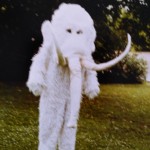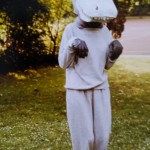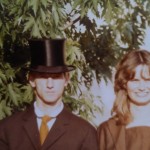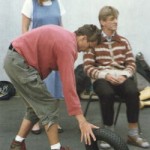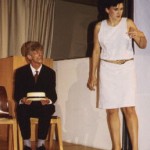Bamberg University English Drama Group
presents the 1986 production of
Thornton Wilder's
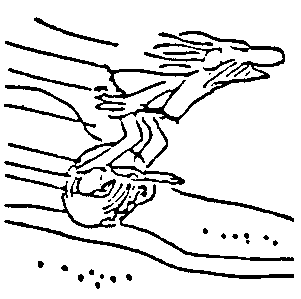

"Don't forget that a few years ago we came through
the depression by the skin of our teeth!
One more tight squeeze like that and
where will we be?" (Sabina, Act I)
The Cast (in order of appearance):
Announcer .............................Georg Schwarzmann
Sabina, the Antrobus' maid ..Cornelia Daig
Stage Manager .....................Mike Claridge
Mrs. Antrobus ......................
Dinosaur ...............................Beatrix Hesse
Mammoth .............................Georg Schwarzmann
Telegraph Girl ......................Ulrike Linz
Henry Antrobus ....................Alexander Hopf
Gladys Antrobus ...................Isabella Weber
Mr. Antrobus ........................Dieter Reichl
The refugees:
Doctor ..................................Michael Ehrhardt
Professor ..............................Christine Dresel
Judge Moses .......................Christoph Geißler
Homer ..................................Ulrike Linz
Miss M. Muse ....................Elisabeth Röthlein
Miss T. Muse .......................
Fortune Teller .......................Beatrix Hesse
Conveneers ...........................Christine Dresel, Michael Ehrhardt, Christoph Geißler, Claudia Kröner, Ulrike Linz, Elisabeth Röthlein
The replacements:
Mr. Tremayne ....................... Georg Schwarzmann
Hester .................................... Christine Dresel
Ivy .......................................... Elisabeth Röthlein
Fred Bailey ............................ Christof Geißler
The Production Team:
Lighting .................................. Jürgen Hoh
Make-up ................................ Sigrid Kolster, Gabriele Allgeier
Masks .................................... Claudia Kröner
Costumes and Props ............... The Cast
Slides and Sound ................... Mike Claridge
Publicity ................................. The Cast and the University Press Office
Poster Design ........................ Ulrike Linz; Dieter Reichl, Gerald Schembs
Front of House ....................... Nodi and Heinrich Ramisch, Edgar Schneider
Production ............................. Mike Claridge
The Play
The Skin of Our Teeth received a very mixed reception when it was first performed in the USA. On the one hand, critics appreciated both the message and the method or medium, a reaction which led to Wilder receiving his third Pulitzer prize. Others, however, found the play almost impossible to understand and some even left the theatre before the end of the performance in bewilderment and confusion. Why was this?
America was just entering the Second World War, and the spirit of optimism in the face of oppression presented in the play was something to which US citizens could not relate. They found it impossible to imagine the feelings of a nation literally under daily attack, a nation reacting to this threat with a rolling-up of sleeves and a determination to quietly overcome the danger without making a great fuss about it.
For precisely this reason, audiences in post-war Europe greeted the play with enthusiasm; the German title Wir sind noch einmal davongekommen had a particular poignancy for the people of this country. More recently, there have been very successful productions in Poland, where the theme of oppression in confrontation with quiet, defiant optimism, the sense that there is a better world ahead if we but continue the struggle, has special relevance.
Is the play to be seen as optimistic or pessimistic, however? To answer this, we must first remind ourselves that Wilder wishes each member of the audience to consider himself or herself personally affected. That is not to say that we are all Mr. or Mrs. Antrobus; rather, the four members of the family and Sabina should be seen as different elements of the human character, each frequently at war with the others, present to varying degrees in each one of us and unable to exist separately. Wilder uses techniques of alienation to bring home the message that what he is saying is true of mankind in general and you, the member of the audience, as an individual. lt does not matter that various events conspire to make it necessary for replacements to read the words of wisdom at the end of the play; they may come from the writings of Spinoza, Plato, Aristotle and the Bible, but they are true for all of mankind in every age.
One possible reason for the original lack of general enthusiasm was the fact that, as one critic put it, „nothing happened next“ in the play. Each act is built to a recurring pattern: Mr. Antrobus falls away from the good path into despair, is brought back to optimism and manages with the family to avoid potential disaster once again. Moreover, the play ends as it starts - so are we to assume that mankind is doomed to a cycle, will never make any progress, will not learn from its mistakes?
lt is perhaps important to mention here the rôle of God. Wilder avoids mentioning Him, except as creator of the world and mankind; God has created everything and then left the running of the world to man. lt is true that all except the shipload are drowned in Act II, but this is not to be seen as divine intervention. After all, it is only by chance that the ship which saves the family is at the end of the pier...
On the one hand, man has certain destructive - even self-destructive - qualities which he cannot dispose of; in Act III, Mr.Antrobus considers shooting his son, but cannot perform the act, cannot kill off a part of himself. At the end of the play, a sullen, rebellious Henry is once again in the family circle. And as one of the quotations from the philosophers at the end of the play makes clear, it is man's fate and nature to fall into sin - this is what makes him different from God. However, man can do his best to keep this evil element under control, and, if he is prepared to make the effort, can eliminate or at least lessen the impact of disasters of his own making.
Man is a natural survivor, therefore, but one who often causes himself more trouble than might be necessary. The optimism of Wilder's message can be seen in the fact that, despite of all the troubles facing mankind, we can still believe that we will survive - as Sabina says at the end of the play,
Mr. and Mrs.Antrobus? ... They're as confident as the first day they began
- and also that we are making progress, thanks to the recorded thoughts and advice of previous generations. To quote Mr. Antrobus, reunited after the war with his books,
We've come a long way. We've learned. We're learning.
The way is hard, and there is much suffering to be endured. In retrospect, we may often shake our heads in despair at our inability to choose - and stick to - the best path. But we can face the future with optimism.
An attempt at interpretation...
In 1941, Thornton Wilder visited England, and was struck by the atmosphere which he found there. The country was in the midst of war, and air-raids were an everyday occurrence. Supplies of food and other necessities were short. Nevertheless, the population showed a defiant optimism in the face of such adversity, a quiet determination to survive whatever might come. When he returned to the United States, Wilder attempted to express in dramatic form this idea of optimism when confronted by disaster, while also wishing to give it both a general and an individual appeal.
Thus we see the Antrobus familiy (Greek anthropos = human being) in three crises. The first presents us with mankind against Nature, in the form of the Ice Age. In the second, man struggles against moral nature, at first yielding but then partially managing to save himself from retribution - the Flood. Thirdly, we see the aftermath of a World War, an example of man's self-destructive instinct - man, in other words, struggling against himself. In each case, our family survives - but in each case, they achieve survival only "by the skin of their teeth"; will they be so lucky the next time?
Act I is opened by an announcer, who sets the scene and introduces us to the Antrobus family. This introduction is developed by the family’s maid, Sabina, and as the act continues we learn more about the various characters, along with biblical and classical references: George Antrobus himself may be seen as Adam, his wife Maggie as Eva, while Sabina has clear traces of Lilith. The son, Henry, is to be identified with Cain, and bears the mark on his forehead. Gladys, the daughter, may be seen throughout the play as an ironic representation of naive womanhood in its various phases - obnoxiously diligent at school, flirting with „the boys", and abandoned with a baby after a whirl-wind affair in a time of stress.
Mr. Antrobus is excited about his new inventions - the wheel and the hundred - and his success in separating "M" from "N" in his continuing development of the alphabet. However, he soon becomes depressed when his wife insists on reminding him of reality - that the ice is becoming worse and worse - and when he is forced to face up to the evil that is in mankind, as personified by Henry / Cain and his constant fights with others. He is rescued from this mood by the good reports of his daughter’s performance at school and the intervention and support of culture and civilisation, as represented by Moses, Homer, a Doctor, a Professor, and the Muses. These have been rescued from almost certain death hy Antrobus himself, who has taken them into his home - much to the irritation of his wife, whose only interest in life is the survival of her children at all costs.
When Act II opens, all seems to be going well - very well indeed. Mr. -now President-elect- Antrobus feels very satisfied with the progress that has been made. The motto for the previous year was „Work", he tells the assembled gathering of the Ancient and Honourable Order of Mammals, Subdivision Humans; the motto of the new year is „Enjoy Yourselves". He proceeds to do just that, flirting with Sabina, who has just won the Miss Atlantic City 1986 competition and is now going under the revelatory name of Lily (=Lilith) Sabina Fairweather. But the storm signals are there for those who have eyes to see - both literally and also symbolically: Henry is becoming even more violent and imitating his father's lecherous tendencies, Gladys sees in the sensuous Miss Fairweather an example to follow, and even Mrs.Antrobus engages in a gratuitous volley of insults. lt is the realisation of this downward trend among others that leads Antrobus to notice and reverse his own drift into immorality and licentiousness, a reversal which is not copied by the other delegates of the Order, who drift into disaster while the family, now reunited with a repentant Sabina, sails away, Noah-like, with two members of each species of animal, male and female.
Act III finds the family coming gradually together after a catastrophic war which has devastated the world and dramatically changed the characters of those involved. Henry is now prepared to kill to achieve a world after his own desires. Mr. Antrobus is totally dejected, and sees little point in continuing the struggle. Sabina has enjoyed a time of hardship for everyone, where all are more or less on an equal footing, and where everyone is at his or her best.
Mrs. Antrobus is the only one who has not developed; she is as disinterested as ever in the fate and fortunes of anyone other than her children, even in the fact that others may be dying, and refuses to accept that her children are now grown up and -at least theoretically- responsible for their actions.
Yet it is precisely Sabina and Henry who cause Mr. Antrobus to start again, to make another effort. And the end of the play suggests that, although mankind is only too mortal and prone to fits of depression and moral lapses, it will still manage to pull itself together and overcome adversity of every nature. Moreover, the experiences of previous generations can be gathered together to the benefit of those who are willing to make the effort and consult the various books in which they are to be found. We thus have the three sources of hope for mankind - the people, the family, and the accumulated wisdom of our forefathers.
(Mike Claridge)
... and the Press said ...
(Fränkischer Tag vom 19. Juli 1986)
University English Drama Group spielte Thornton Wilder
Zeitlos aktuell und nötiger denn je
Interpretation von „Wir sind noch einmal davongekommen" gefiel
Die Bamberg University English Drama Group unter der offensichtlich unkonventionellen und engagierten Leitung von Mike Claridge bot dem von Festterminen verwöhnten Bamberger Publikum einen gesellschaftspolitischen Dauerbrenner, Thornton Wilders fast ungekürztes The Skin of Our Teeth (Wir sind noch einmal davongekommen). Die Premierenvorstellung fand am 9. Juli im sehr gut besetzten Schulbühnenraum des Dientzenhofer-Gymnasiums statt.
Wilders Pulitzer-Preis-Stück über die Möglichkeiten des Überlebens der menschlichen Rasse ist zeitlos aktuell: Es enthält damals (Bewältigung des Zweiten Weltkriegs) wie heute (Tschernobyl) tagespolitischen Zündstoff und verlangt vom Zuschauer aktives Mitdenken und Mithören, was den besonderen Reiz der Aufführung ausmacht. Claridge und seine Truppe waren sich dieser Verpflichtung bewußt. Die eindringliche Wiederholung von Schlüsselsätzen und aufrüttelnde Dias aus dem Vietnamkrieg als direkt vor den 3. Akt gestellter Programmteil vermittelten Zeitbezug. Eine lange Folge von zum Teil unter die Haut gehenden Bildern verwundeter Kinder, verzweifelter Mütter, aber auch von GIs, die ihre Kameraden haben fallen sehen ... Und dann übergangslos der 3. Akt: der Neubeginn nach dem langen Krieg.
Als Schauspielerin überragte Sabina (Cornelia Daig) ihre Mitspieler. Sie wirkte immer überzeugend, eindringlich, vielseitig - von nörgelnder, kündigender Haushaltsgehilfin bis zur verführerischen Schönheitskönigin - und virtuos in ihrer Zweisprachigkeit. Wilders Regieanweisungen wurden durch Sprachwechsel herausgearbeitet, eine faszinierende Möglichkeit des fremdsprachlichen Theaterspielens: Als Archetypen sprach die Familie Antrobus (deren Name auf Griechisch „Mensch" bedeutet) Englisch, als Individuen auf der Bühne ihre Muttersprache. Dabei machte das unverfälschte Schwäbisch des Mr. Antrobus (Dieter Reichl) für Bamberger Ohren den Bewußtseinswechsel besonders deutlich. Er bestand überzeugend die harte Prüfung der Sprachwechsel und des Rollenwechsels vom genialen Familienvater zum Präsidenten der Säugetiere wie auch zum heimkehrenden Soldaten. Durch große Leistungen der Maskenbildner (Sigrid Kolster und Gabi Allgeier) gestützt, spielten die anderen Darsteller zur Hochform auf. So Mrs. Antrobus (Iris Wagner), deren Temperamentsausbrüche zur Rettung des Glücks ihrer Kinder bei aller sonstigen Biederkeit immer echt wirkten. So auch Henry, der notorisch unartige und unruhige Sohn, der als „Kain" mit einem leuchtend roten Mal gezeichnet war (Alexander Hopf). Die Flüchtlinge erhielten alle in der Eiszeitszene ihre individuellen Entfaltungsmomente und beeindruckten durch oder wegen der extremen Verschiedenheit der einzelnen Rollen.
Alles in allem eine 3-Stunden-Energieleistung, deren wenige sprachliche Ungenauigkeiten unbedingt nachgesehen werden müssen Die Aufführung bestach durch den sparsamen, aber effektiven Umgang mit Requisiten, durch die präzise arbeitende Technik, durch die Einbeziehung des Zuschauerraumes (der die vorrückende, todbringende Eiswand oder das tosende, alles verschlingende Meer symbolisierte) und durch die schon erwähnten, die Schauspieler als, Individuen entlarvenden Sprachwechsel.
Das Stück ist notwendiger denn je. Nur: wird bei uns, bei der nächsten Katastrophe, das sichere Boot wieder so bequem zur Verfügung stehen wie in Wilders zweitem Akt? Wilder wurde oft gebeten, einen 4. Akt zu schreiben. Eine Andeutung (etwa eine Radiomeldung über Tschernobyl) gegen Ende würde den Gegenwartsbezug noch erhöhen. An Kriege konventioneller Art haben wir uns doch schon gewöhnt, oder?
Wohlverdienter, lang anhaltender Applaus eines (hoffentlich) nachdenklichen Publikums entließ die Akteure.
KH
(Vorankündigung im Fränkischen Tag, ca. 6. Juli 1986)
Bamberg University English Drama Group lädt ein
Krisenreaktionen einer "typischen" Familie
"The Skin of Our Teeth" ("Wir sind noch einmal davongekommen") wird gespielt
Die Bamberg University English Drama Group führt auch in diesem Semester wieder ein Stück auf: The Skin of Our Teeth (Wir sind noch einmal davongekommen) von Thornton Wilder. Das Hauptthema des Stückes ist die Darstellung der Menschheit in drei verschiedenen Krisenzeiten: der Eiszeit, der Sintflut und der Zeit nach einem Weltkrieg. Symbol für alle Menschen ist eine „typische" Familie, deren Reaktionen auf all diese Ereignisse gezeigt werden.
Mr. Antrobus (gr.: anthropos = der Mensch) ist, wie im ersten Akt deutlich wird, ein begnadeter Erfinder und eine von allen anderen hochangesehene Respektsperson. Sogar die Musen, Homer und Moses sehen zu dieser Adamsfigur auf, als Sie in seinem Haus Zuflucht vor dem immer näher rückenden Eis suchen.
Die nächste Katastrophe, die der Familie droht, ist die Sintflut. Der fast schon sichere Tod wird nur durch Antrobus’ Fähigkeit, der Familie Verhaltensmaßregeln und neue Hoffnung zu geben, abgewendet. Am Anfang des zweiten Aktes ist Antrobus, der inzwischen zum Präsidenten gewählt wurde, allerdings nicht bereit. die Initiative zu ergreifen. Zuvor war dieser Unwille das Resultat seiner Verzweiflung über das unmögliche Verhalten seines Sohnes Henry (= Kain), den er als nur ZU typischen Vertreter der menschlichen Rasse erkennt, was ihn an allem zweifeln läßt.
In dieser zweiten Krise der Menschheitsfamilie ist Antrobus davon überzeugt, daß alles in Ordnung ist - ja sogar, daß das Leben gar nicht besser sein könnte. Und so flirtet er heftig mit der Gewinnerin der Wahl zur „Miss Atlantic City l986" und verschließt sich jedem Wunsch, ihn auf die drohende Gefahr aufmerksam zu machen. Als er endlich begreift, daß es lebensnotwendig ist, sofort zu handeIn, begegnet ihm überall nur Unglauben. Am Ende des Aktes sehen wir die Familie Antrobus wie Noah in seiner Arche davonsegeln: mit je einem Pärchen jeder Tiergattung an Bord.
Am Beginn des dritten Aktes kehren die Familienmitglieder aus dem Krieg zurück; aus einem Krieg, der nicht nur die ganze Welt durcheinandergebracht und zerstört, sondern auch den Charakter der meisten Betroffenen verändert hat. Unerwarteterweise ist es der mißratene Sohn, der Antrobus’ Optimismus und das Bestreben nach dem Wiederaufbau erweckt; und es ist Sabina, das normalerweise zynische Hausmädchen, die Antrobus in dem neugefaßten Beschluß zum Neubeginn bestärkt.
Zuletzt werden die Philosophen verschiedener Epochen der Menschheitsgeschichte beschworen, um zu verdeutlichen, daß wir selber aus den Erfahrungen unserer Vorfahren Mut schöpfen sollten. So können wir uns auch auf kommende Katastrophen vorbereiten. Und Sabina sagt am Schluß: „Mr. und Mrs. Antrobus? Sie haben den Kopf voller Pläne und sind zuversichtlich wie am allerersten Tag."
© "I'm coooold"-Productions Ltd. 1985
We would like to convey our special thanks to the following:
Professor Jochum and the Department of English Literature for official support and unofficial encouragement
The Dientzenhofer Gymnasium Bamberg and the Bamberg Town Council for permission to use the school, and Mr. Poppe for technical assistance
The E.T.A.-Hoffmann-Theater for help in many aspects, and especially Detlef Rezepka and Charif Swed
Mr. Liedtke, Fränkischer Tag and Bamberger Wochenblatt for publicity
Mr. Büttner for long-suffering patience with us during rehearsals in the DG
The Deutsch-Englischer Club Bamberg e.V. for support
and especially Mr. Oppelt for his great help in finding us a theatre in which to perform, and then circulating the details to such a great extent
... not to forget Juliette and Minette for services beyond the calls of duty!






